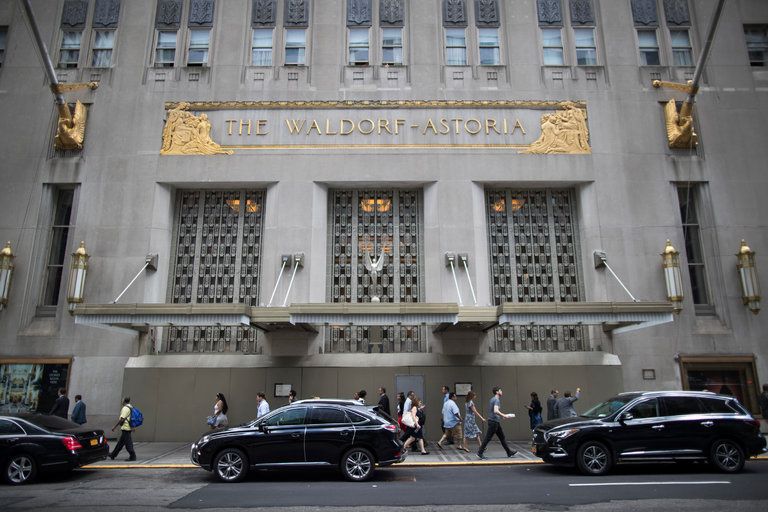Media Report

- The New York Times reports: "China moved on Friday to curb investment overseas by its companies and conglomerates, issuing its strongest signal yet that it wants to rein in runaway debt that could pose a threat to the country's slowing economy. Beijing has stepped up its efforts in recent months to restrict some of its most acquisitive companies from buying overseas assets, worried that a series of purchases by China's conglomerates around the world has been driven by excessive borrowing. In the latest move, a statement published by China's cabinet, the State Council, said the authorities would punish companies for violating foreign investment rules, and establish a blacklist of businesses that did so... The statement pointed to acquisitions in sectors ranging from entertainment and sports clubs to hotels, but it was unclear whether or how the government would block deals."
- Newsweek reports: "A high-ranking Chinese military official criticized U.S. actions in the Pacific as detrimental to the 'mutual trust' between the countries' militaries. Fan Changlong, a vice chairman of the Chinese Central Military commission, made the remarks on Thursday during a visit to Beijing by General Joseph Dunford, chairman of the Joint Chiefs of Staff, which was designed to further military cooperation between the two nations. Fan acknowledged that the mutual trust between the two militaries had seen 'healthy development' in the past few years, but he criticized recent U.S. actions as 'wrongful.' 'U.S.'s 'wrongful actions' such as meddling in Taiwan, establishing Terminal High Altitude Area Defense (THAAD) around China, spying closely on Chinese sea and air territory, and constant activities by U.S. planes and ships in the South China Sea, have had a negative effect on mutual trust and military-to-military ties.' ...Last week, China condemned in similar terms the U.S. Navy for carrying out a 'freedom of navigation operation,' the third since Donald Trump became president... The other thorny issue for China is the U.S.'s recent deployment of the THAAD missile defense system in South Korea, which is designed to shoot down ballistic missiles and is seen as the first and most prominent defense against a possible attack from North Korea."
- The Washington Post comments: "President Trump's right-hand guy Steve Bannon has been called everything from a 'mastermind' to a 'racist, anti-Semite.' Regardless of what you think of Bannon, he just made a very good point about China. 'To me, the economic war with China is everything. We have to be maniacally focused on that,' Bannon told the American Prospect in a jaw-dropping interview that covered everything from urinating on yourself to North Korea. 'If we continue to lose it, we're five years away, I think, 10 years at the most, of hitting an inflection point from which we'll never be able to recover.' Many experts across the political spectrum say Bannon is right: China is beating up America economically, and neither the U.S. government nor U.S. businesses have done much about it for years. 'It's a weird day when I agree with Steve Bannon, but he's right on this,' says Jennifer Harris, a China expert at the Council on Foreign Relations and a former top staffer in President Obama's State Department. 'Going back to George W. Bush, America's policy toward China has been to ask nicely. That has not panned out well.'"
Calendar
- 2017-08-17 Steve Bannon, Unrepentant
- 2017-08-16 U.S. and China Ink Military Agreements; Mattis And His Troop Talk
- 2017-08-15 Trump administration goes after China over intellectual property, advanced technology
- 2017-08-14 We're Holding Pyongyang to Account
- 2017-08-13 China a sweet spot for US companies' earnings in second quarter
- 2017-08-11 China warns North Korea: You’re on your own if you go after the United States
- 2017-08-10 When the U.S. Last Faced an Emerging Nuclear Threat in East Asia
- 2017-08-09 Trump appears to grant China banks sanctions reprieve after UN deal
- 2017-08-08 China's international trade grows less than expected, surplus with US dips
- 2017-08-07 China says it’s done its part to rein in North Korea—now the US and South Korea should step up
News
- The New York Times China Steps Up Warnings Over Debt-Fueled Overseas Acquisitions
- Newsweek U.S. Military Damaged Mutual Trust With 'Wrong' Actions On Missile Defense and South China Sea
- Bloomberg China Codifies Crackdown on 'Irrational' Outbound Investment
- CNBC Forget North Korea — here's the other Asia flashpoint that has analysts worried
- Washington Examiner Steve Bannon says we're at 'economic war with China.' Here are the studies that back him up.
- CNBC China's new problem: 'Frenzy' of consumer lending creates debt 'explosion'
- The New York Times Film by Beijing Students Explores Being Young and Transgender in China
- Vox China is trying to look tough on North Korea. But it might just be for show.
- Reuters China's new home price growth cools in July
- Bloomberg China Home Prices Rise in Fewer Cities as Market Cools
- Quartz Forced to comply or shut down, Cambridge University Press's China Quarterly removes 300 articles in China
- The Washington Post Skeptics dismiss Bannon's call for economic war with China
- Bloomberg China Codifies Crackdown on `Irrational' Outbound Investment
- Business Insider The US Navy is getting a 'game-changing' upgrade that could turn the tables on China and Russia
Commentary
- The Washington Post Think what you want about Steve Bannon, but he's got a good point on China
- The National Interest Bannon's Pugnacious Restraint May Be Missed
- Slate Steve Bannon Gives an "Interview" That Makes Him Look Suspiciously Sane
- The Hill American steel needs support as China keeps breaking promises
- Foreign Policy Tokyo and Washington Have Another Nuclear Problem
- Business Insider Steve Bannon will crash our economy if no one stops him
- American Action Forum The Economic War With China
- Forbes How China's Central Bank Is Clamping Down On The Mobile Payment Industry
